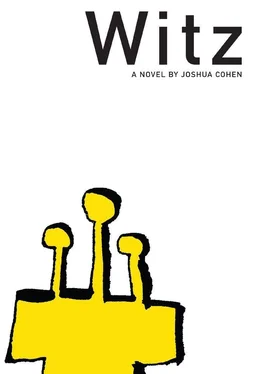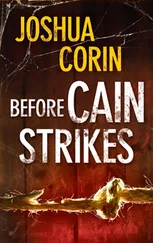Here, this place of worship of nondenomination…enough to know that it’s theirs, not much longer — arching Magnificat, delicate yet hulking, an elemental transcendence of elements, less rock and stone than an architecture of them that is in its totality history itself, an earthrecord, time bound within a complex of complicated masonry, ascetic iron, vitirform trills, rills of gold. Here, they’re here to pray, to flagellate themselves with tongues, to mortify — to pray though for what they’re not sure exactly, besides the condition of prayer itself, innerness, attentive mindquiet: for salvation, maybe, for an afterlife, perhaps, let me go without pain — to consecrate themselves worthy of such terminal martyrdom, it’s important before anything else to make a firm ground of faith, to more deeply found their belief. Please, let us go, let me loose and I promise to do whatever I’m asked, even hope…O if only You would send us an angel, an aeroplane and fast, parachute me a new pair of shoes. Redeem me first, then we’ll talk about trust. Blame, later bargain. All fall to their knees, the Sandersons prayer to prayer. From its console in back, the great organ shakes, throaty pipes, its diapasons woken to rattle, giving a gag; divisions shatter like the stains of the glass, admitting pure light. To pray for their own souls, no — to prey on the souls of family immemorial, sacrosanct and died long ago, whose scavenged holiness might merit for their inheritors, they wish, the most meager of Miserere, all they Psalm to ask. To be delivered into the very hands of the stigmatic, openpalmed, dirtynailed…clasped seeking prayer, clasped seeking the blessing of prayer — for the miraculous resurrective unto the sacristy’s hide, Amen, hold me near. Mold weeps from the altar, flows from the skinflint folds of the wormworn antependium, the glaciate rot of settings high and without jewel atop the jut of the retable, the reredos, oozing wet down the apse westward toward the opposite apsis, down the nave, also, toward the stumps of the transept, its cruciform arms uncrowned, without hands, fingerless…sheathed in thorns iceformed, iciclebarbs, clots of cold veining the floor, which is marble. A dust stirs, as they kneel to rise only to kneel again, then rise again, and then again kneel. Hassockfooted sons of a Father with the head of a Son, they swallow their paternosters in a teemed teething of lips: less to invoke the divine, His mercy, not one authority holds, than to ensure the remembrance of history, the good faith of record — if such ideas as History and Record could ever exist in a future to which we, too, would impossibly survive.
Pray, Miriam’s offering encouragement, pray your hearts out, if hearts you have; this is your last opportunity, be…how do you say it? be grateful, that’s it, for your lives, for its plenty, what was. Thank us; thank your God for us.
Again, she reminds — don’t forget to enjoy yourselves. I’ll be back to collect you all in an hour.
Above them, the bells: their waves ripple out a sea in the air — an ineluctable mass of soundweather, the sonant oceanic, a diluvian rumbling flume: it reverberates a rusty air, stifled dully by that other wet coming in through the belfry, the eaves. They’re too many tolls…they can’t all be counted, how much time: their ringing descending deep from the hollows to patronize the leaden vaulting below; they’re heard resounding as if brass beaten to lime, encrusted in cirri, balmcaked in salt; theirs less a bright clanging clank in the belfry than the clattering shatter of frozen fire; less the brilliant lick of an icebound bell than the cloudcast sounding of an anchor struck wreck: the walled claps of the bells’ wake swelling a sensed force into a felt power…reaching upward in prayer, our worshippers making as if to clasp them beaten as hearts to their breasts, are then knocked down into a thronging Mass, humbled, made modest at the knee — the hindmost hinge in the door of their bow, the gate of their prayer: to enter the sound that is the church, the sonic itself that is the cathedral with them rendered unto air, the substance of only an echo; to exit, they have merely to remain ringing until they’re no longer — to shut their mouths, stand alone. Fade. They’re pewed, rowed, fallen down to one knee, bent to grovel at the hovel made of another’s bow — the father one ahead, the stranger one over, the same. Then, they’re righted again, now again, up and down they creak, they crack, as if their bones are deadened wood, suffused with an ache, dull as deepgrained, the knotted throb of limbs, sapped alive if cold with thin blood. A few older members of the Group, many of them more stubborn than believing, more habitual in this than ever swayed by a faith, they get up after an initial kneel, sweep their slacks and skirts of dirt and must, remove themselves from pews’ hassocks to the seats rowed along the walls in cornered chapels, to sit a while and think less of God than of the art hung around them. To look and whisper, to point and listen and touch and — to tour. Then, as if not feeling quite confirmed in their covenant, whatever that would be, they all, eventually and without exception, fall down again, prostrate: to make meek, an attempt at the inevitable abject, their souls weak, but pathetically true; humility as an order of wretched sublimity — the immodest shame of those who would seek eternity not in heaven (which for us is merely the forgetting of earth, a mundane, temporal forgetfulness), but rather in the lives of tomorrow, the future; their names to be writ into prayers to be invoked by generations, of and for generations, to come, seeking favor far in excess of anyone’s merit, even that of the very son of God, whose image — which merely usurps the miracle of his existence, they should be told — is splayed up on high, nailed to a cross just beyond the further altar. Up and down they kneel and they narrow, they straighten, they genuflect, bow down and up — as if this Group’s nothing but a congregation of marionettes (which are a local kraft-product, and after antique home furnishings Polandland’s most notable export), wunderpuppets strung down on spidery strands from the vertex of the highest spires, tugged to the innermost peaks of the vaulting and from there set down slack on their wood, the flaking flesh, now made to rise up again, then down upon their knees again and again, writhing along with the snakelike wriggling that holds them: slitherine dust, illuminated through the roseate windows, mullionmartyred, the iron hairs of the sun, them being made to cross themselves madly and, inevitably, silly…tangling, becoming knotted with the crux of that sacrifice maddeningly ancient, laughable as so long ago and yet still worshipped, held in immemorial awe. Spectacles, testicles, it went, wallet & watch, and with time almost up: all those millennia later and still they libel us with blood, long deserving, earning, their present fate — the conscience of such curse…to cathect every Christ’s the idea, the sacred heart of the Mater, dolorosa, virginal in punishment, mangered new to a retribution as exacting as this: they pray to her, too; her son, they’ll begin to ignore: if any would survive, they’d survive without him, soon to regard God’s putative heir with less love than pity, the submission of only a pitiful shrug — now that they’d know what he went through, now that they’d know what even he didn’t survive.
Dogma, it’s worthless, gone to the dogs to bury bonedeep…and the lion shall lie down with the lamb, sure, right, whatever you say. They’re thinking, what makes a ghost holy, what’s so holy about any old spirit, and what makes being holy that much better than being alive — a catechismic calamity, lost. They weep a last Lacrimosa; their teary mass rips a voice through the Mass. Have mercy on us, Kyrie, whether we be flawed or perfected as one. To sing through a single mouth, sunmutual, sunswallowing — silent. Lord in Heaven, we’re homesick…there’s a moon through the window, it’s time to go home. Miriam, her umbrella ever aloft (clutching in her other hand a weave of basket, her own late brunch), wades through their tears down through the nave, through the reeds of their rush, their quick murmur to finish, to sum — then herds them, in a docile flock, as compliant as corpses already, back down the nave again and out the doors of the Church, parting, their weeping streaming out in advance of them, though, as if to announce their end to the coldbrazen air: their flow to freeze, then, into a slip of steps; they slide down them, this stair shed of flume, how they fall — into the gaping, screwtoothed mouths of waiting trucks, gasping exhaust, to be hauled out to the sorrowed stations, and there…trucks dumping their burden to the insatiable bellies of idling, smokefoaled trains: their tracks as long as the rail of the day and as torturous, thrashing, wild — chartered by dusk, they’re to be hauled through the night, for tomorrow’s yawn, the dawn of their death…
Читать дальше












